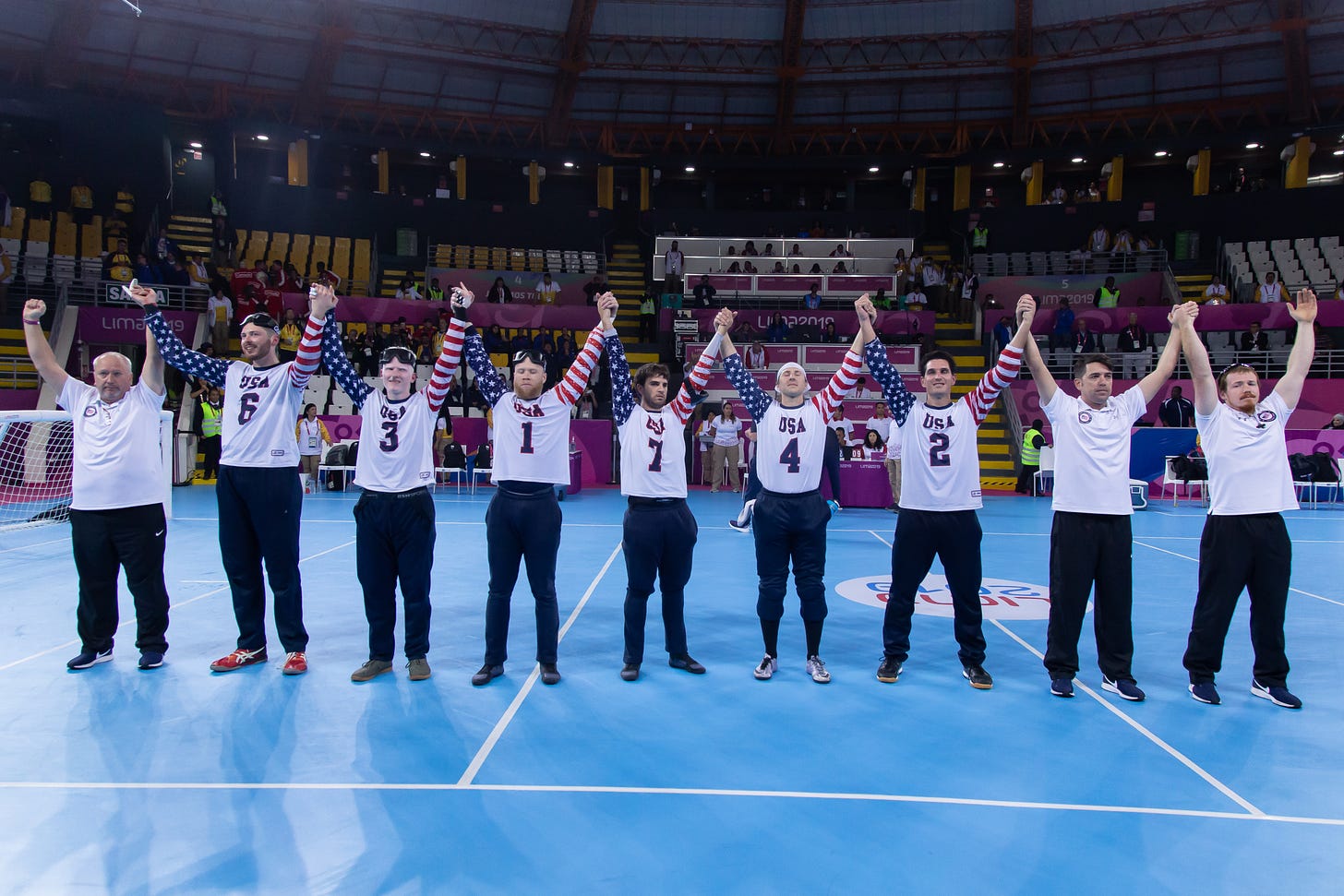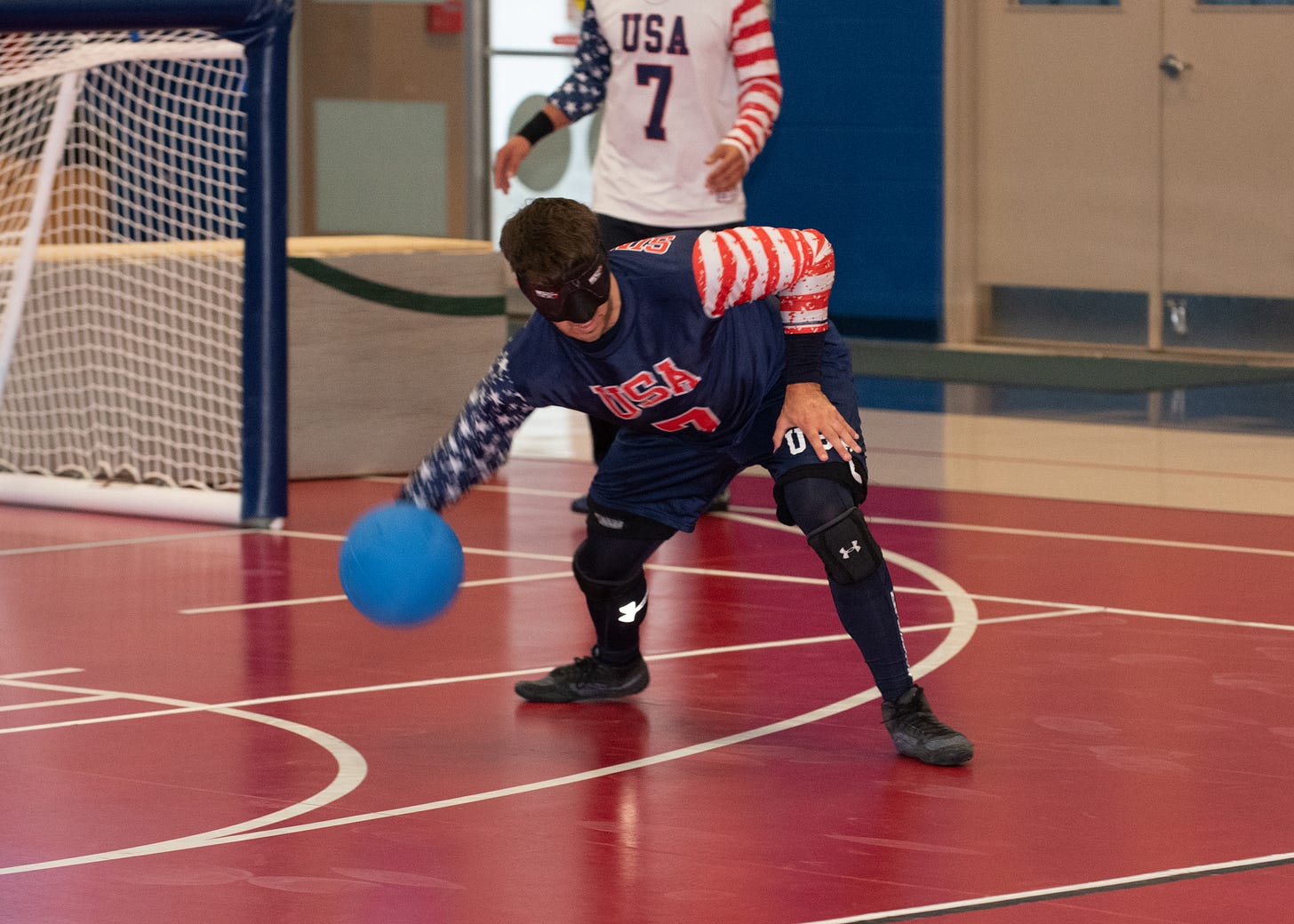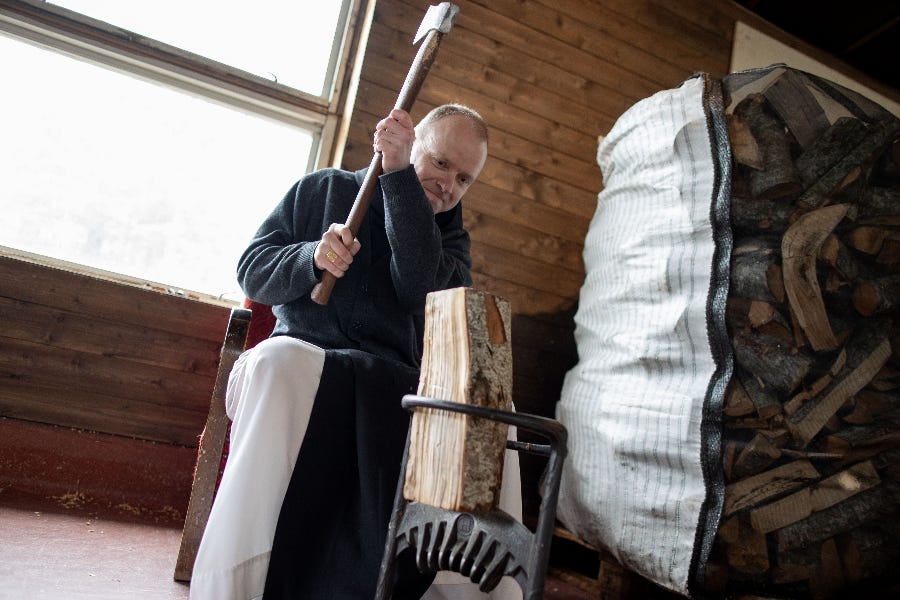Matt Simpson stepped onto a Rio de Janeiro Paralympic court in 2016 with a mixture of pride and adrenaline, honored to wear a national team jersey, and buoyed by the cheers of 10,000 people settling into the stands.
Those fans had come to watch Matt and the rest of Team USA go for gold. To leave it all on the court. To play heads-up defense and lights-out offense.
They had come to see Matt play goalball.
Goalball?
—Excuse me, but what the hell is goalball?—
Matt gets that a lot. He really doesn’t mind.
“I tell people it’s kind of like a mix between reverse volleyball and reverse dodgeball. You have a volley back and forth, but instead of hitting over a net, you’re throwing it on the ground. And then instead of getting out of the way of the ball, you’re getting in front of it,” he explained.
Oh, and one more thing. The players are blind. And if not completely blind, they’re blindfolded. They only know where the ball is going by the sound of two bells tinkling in its core, and by the feeling of its cutting path across the court.
If that game sounds placid or easy, think again. The ball is a three pound rubber sphere, and it gets thrown fast — upwards of 50 miles per hour at elite levels. And just 50 feet from where it’s pitched, players dive across court to stop the ball’s path with their bodies. Then they hop up and whip the ball toward the other team’s goal. Each team might have 100 possessions in a 24-minute match.
Goalball is intense.
“When you realize just how hard that ball is and just how fast it’s going...it is an extremely physical sport. It’s a rough game, for sure,” Simpson told The Pillar.
Goalball is also the only sport in the Paralympics which began with disabled people — not as an adapted version of something else, like wheelchair basketball or sitting volleyball, but as its own thing, developed for blind people, and tailored to the experience of living without sight.
“So goalball was actually created right after World War II, by a couple of Austrian doctors who recognized the need to rehabilitate soldiers who had been traumatically blinded in the war,” Simpson explained.
“And how better to get some young, athletic, competitive men back on their feet than sport?”
“Their hope was to not only get these guys back on track through competition, but also to teach a lot of the skills that are really tough to come by for people who are blind — proprioception skills, orientation skills, basic things, even, like, how do you walk in a straight line [without sight]? How do you turn at a right angle?”
“Those things are hard enough for someone who was born blind, but even more difficult for someone who loses their vision.”
“From there it became a part of the Paralympics in ‘76, and has been contested there ever since then.”
When Simpson took the Paralympic court in 2016, it was the culmination of a 15-year journey. He was born with a genetic retinal condition that caused his vision to gradually decline through childhood; he is now completely without sight. He found goalball when he was 10 years old, and his vision was already very limited.
In an essay published last month, Simpson explained what it meant to start playing goalball.
“Finding the sport meant much more than just finding a game to play. I found an outlet where I could win or lose, succeed or fail, and the only thing that didn’t matter in goalball, unlike everywhere else, was how much I could see.”
“It mattered that I was unskilled at the game. It mattered that I was a scrawny kid who couldn’t throw that three-pound goalball hard enough to intimidate anyone, much less actually score a goal. So, I set out to be the best.”
He decided to be one of the best, and Simpson got there. He played for a world championship with Team USA in 2014, trained at the Olympic training center and the national goalball training center. He had his own Uber commercial.
And he was a key part of Team USA’s roster at the 2016 Paralympics.
The team made it all the way to the gold medal game in Rio. But with gold on the line, they suffered a big loss to Lithuania, and walked away silver medalists.
“Lithuania has been really good for a really long time, and they had never won the Paralympics. They won the world championship two or three times, but they finally won their gold. They had the best player in the world for two decades, Genrik Pavliukianec, and he finally won his gold. So it was cool to see that, even as we were at the wrong side of the outcome in that game.”
Simpson had four goals in the gold medal game. But when it was over, he wasn’t sure if he would play with the national team again. He was going to law school. And the Rio Games had been tough on him.
“For me the Rio cycle was really frustrating. I tore my bicep in January of 2016 and broke my finger maybe eight weeks before Rio. So I came in with a lot of injuries beyond my control. And I really didn’t have the game that I wanted to have from a personal perspective, even though I was, of course, overjoyed for the team’s success.”
He meant to hang it up after the Paralympics. But when Team USA’s coach reached out to Simpson and asked him to play, he agreed to come back in 2019 to help the national team qualify for the 2020 Games. And after that, Simpson knew he wanted to play again on the global stage.
And this time, he knew he wanted a gold medal.
Of course, there were no 2020 Paralympics in 2020. The pandemic meant that, like the Olympics, they would be pushed back to 2021.
For Simpson, that means when he takes the Paralympics court wearing a Team USA jersey this month, a lot of things will be different.
At 31, he’a a team veteran. He’s also a new father. And Simpson and his wife are also new Catholics; they entered the Church together in June 2020.
Simpson says he’s got an entirely new perspective on the game he loves.
“My faith has been deepened so tremendously just by taking part in the daily life of the Church. It’s also been so encouraging to have the structure and practices of Catholicism. Praying the rosary has been so helpful as a foundation and a routine.”
“Another really big thing for me has been learning about the saints and taking encouragement from their example. Seeing their faith lived in their daily lives — whether it be Newman, my patron, or Thomas More, big for me as a lawyer, or St. Sebastian as an athlete,” he added.
“All of this has been so helpful to give me perspective on what I get to do, but also to put it in the bigger picture — the fact that I get to play this game for my country. And whether or not anyone is watching, I’m representing my country and everything I do can be given to God.”
Faith has meant finding new joy, and new meaning, on the goalball court.
“In discovering the fullness of the Church, I’ve learned, or can understand a little better, what it means to be able to find joy in everything that we do.”
“I think as a Protestant I sometimes struggled to understand how to relate the world as I experienced it to Christ. And as a Catholic — well, Chesterton was a big influence into the Church for me, especially his joy at creation, and his joy at life.”
Simpson recalled a favored passage from G.K. Chesterton’s “The Ethics of Elfland.”
The sun rises every morning. I do not rise every morning; but the variation is not due to my activity, but to my inaction. Now, to put the matter in a popular phrase, it might be true that the sun rises regularly because he never gets tired of rising. His routine might be due, not to a lifelessness, but to a rush of life. The thing I mean can be seen, for instance, in children, when they find some game or joke that the specially enjoy. A child kicks his legs rhythmically through excess, not absence, of life. Because children have abounding vitality, they are in spirit fierce and free, therefore they want things repeated and unchanged. They always say "Do it again", and the grown-up person does it again until he is nearly dead. For grown up people are not strong enough to exult in monotony. But God is strong enough to exult in monotony. It is possible that God says every morning, "Do it again" to the sun; and every evening, "Do it again" to the moon.”
To Simpson, Chesterton offers a reminder that “I can go play goalball for the glory of God.”
“God loves when we love to do what we do. I think I have a much better appreciation for that,” Simpson added.
Simpson’s newfound Catholic faith, which came slowly through the influence of books and friends, and ultimately in discussions with his now-wife, has also shaped his perspective on his own blindness.
“When the world tells you every day that you are disabled, and that you are lacking something...how does that impact your own perception of your value, and of those other gifts that God has provided?”
“And for me, I think it’s two sides of the same coin: Being able to recognize that I need help, both in a blindness sense and also in a salvific sense, but also recognizing that God has prepared and equipped me, exactly as he saw fit, and that being contrite or kind of backing down because I am disabled is not what God wants for me.”
“There's so many times where it's very easy to think, ‘Well, that person can see, so they probably know something better than I do.’”
“In the realm of driving a car that’s definitely true. But in the realm of life, it’s 100 percent not true, and oftentimes the exact opposite, right? So I think for me that means finding the boldness in Christ and saying [to myself], ‘God has put me here to do X, Y, or Z.’ And being willing to allow that I am capable of those things, in spite of the fact that most of the world would look at me and recognize my deficit.”
Simpson finds reminders of that dignity on the goalball court.
“I wouldn’t have been able to recognize my abilities, and my ability to compete, and to strive, and to seek excellence, were it not for the level playing field provided by goalball. And it’s something that I am uniquely equipped for.”
“I always say that goalball is a sport that’s all about who’s the best at being blind. We kind of practice goalball everyday, you know, just by walking around. Even that I’m really good at, you know, things like walking in a straight line and not getting hit by a bus — that’s kind of practicing for goalball,” he jokes.
Ahead of the Tokyo Paralympic Games, which begin Aug. 24, Simpson’s practice has been much more focused, and much more intense. He and five teammates have spent a lot time in the weight room, in the film room, and on the court, getting ready to compete for a gold medal.
Still, Simpson told The Pillar he’s tasked as a Christian with another kind of practice.
It’s the practice of virtue, in the face of the misperceptions that come on a daily basis for some people with disabilities.
Simpson jokes about the way his disability is often misunderstood. He’s blind, he says, but his hearing is not impaired.
Still, it happens often: “I meet someone on the street, or in public somewhere, and they start, you know, speaking to me slower and louder.”
“And I think the blessing of that is that it’s really easy to figure [people] out, you kind of have this automatic filter on people. You have an automatic and enhanced BS detector, because you can tell who is respectful and willing to learn and willing to be taught that their preconceptions are not necessarily right.”
“And then you can tell very, very easily who thinks they know what it means to be blind or disabled or whatever. And they're going to treat you as something lesser, no matter what.”
“And so I’ve come to look at that as a blessing, because I don't have to try to become friends with somebody who’s not going to end up being very genuine in the first place.”
“And certainly one of the things that I struggle with the most is patience with that...And, as a faithful Christian, I want to love people in their wrongness, even as I am so blessed and reliant upon the generosity of others. You know, there's not a day goes by that I’m not in a situation where I need the assistance of someone else, and that's just the reality of blindness, but also, of course, of life.”
Goalball is a way to change perceptions, Simpson said.
“We talk about sports, and the Paralympics, as an opportunity to educate. As frustrated as I might get by someone who has just wildly incorrect preconceptions, it's still an opportunity to educate,” Simpson said.
To win gold in Tokyo, Simpson will need to rely on his teammates, and he’ll need also to trust in his own abilities, and the skills he’s worked on for for years. And for kids who experience disabilities, Simpson said, sports can be a way to learn to compete in a world that will include serious challenges.
He mentions that there are nearly 65,000 school-aged children in America who experience blindness or serious vision impairment.
“And, you know, most of them are not being given opportunities even for recreation with their peers, much less competitive sports. And you want to talk about a population that needs to learn hard lessons, that needs to learn, you know, no matter how inclusive a society would want to be, we live in in a world that is created for the sighted — that's not wrong, that's just reality. And we need to learn how to win and how to lose, and how to compete on something of a level playing field. And how to work everyday at being the best.”
Simpson said that for disabled people, “it’s often easy to feel like one deserves less—a lesser family, lesser career, lesser outcome in anything—because you are disabled.”
Partially through sports, he said, the Lord has shown him those perceptions aren’t reality.
“God has continued to open these doors and bless me in amazing ways,” he reflected.
Goalball has been part of that — an “incredible blessing in a way that I really didn’t think possible.”
Simpson hopes his team’s play in Tokyo might inspire other people with disabilities, especially kids with disabilities, to take up sports and believe in their potential.
But his first goal is to come home with a gold medal.
Because of the pandemic, the Paralympic tournament will be unpredictable, he said. The national team has not played in most of the international tournaments it usually plays to warm up for the Paralympic Games, and it’s not clear how much training other teams have been able to do.
Ten teams have qualified for Tokyo. And Simpson told The Pillar that “there’s six teams that could win and it wouldn't be surprising to anyone.”
“But I’m extremely optimistic,” he said, citing the development of younger players and time for the team to coalesce.
“I think the sky’s the limit,” he added, “but we’ll see.”





